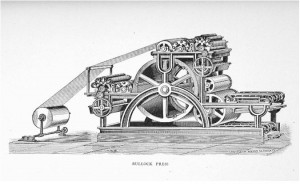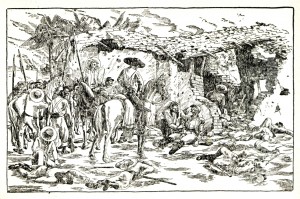Events of the World: April 1863
Posted By Brian Tomlin on April 30, 2013
April 1863
 April 14. William Bullock patents the continuous roll printing press, which drastically sped up the printing process. The press could print up to 12,000 sheets an hour; later improvements raised the speed to up to 30,000 sheets an hour. Richard March Hoe had invented the rotary press in the 1840s, but Bullock’s press was an improvement over Hoe’s design. Bullock’s press allowed for continuous large rolls of paper to be automatically fed through the rollers, eliminating the laborious hand-feeding system of earlier presses. The press was self-adjusting, printed on both sides, folded the paper, and a sharp serrated knife that rarely needed sharpening cut sheets with rapid precision. In a bizarre accident, Bullock was killed by his own invention. On April 3, 1867, he was making adjustments to one of his new presses that was being installed for the Philadelphia Public Ledger newspaper. Bullock tried to kick a driving belt onto a pulley. His leg was crushed when it became caught in the machine. After a few days, he developed gangrene. On April 12, 1867, Bullock died during an operation to amputate the leg. He is buried in Union Dale Cemetery on Pittsburgh’s North Side.
April 14. William Bullock patents the continuous roll printing press, which drastically sped up the printing process. The press could print up to 12,000 sheets an hour; later improvements raised the speed to up to 30,000 sheets an hour. Richard March Hoe had invented the rotary press in the 1840s, but Bullock’s press was an improvement over Hoe’s design. Bullock’s press allowed for continuous large rolls of paper to be automatically fed through the rollers, eliminating the laborious hand-feeding system of earlier presses. The press was self-adjusting, printed on both sides, folded the paper, and a sharp serrated knife that rarely needed sharpening cut sheets with rapid precision. In a bizarre accident, Bullock was killed by his own invention. On April 3, 1867, he was making adjustments to one of his new presses that was being installed for the Philadelphia Public Ledger newspaper. Bullock tried to kick a driving belt onto a pulley. His leg was crushed when it became caught in the machine. After a few days, he developed gangrene. On April 12, 1867, Bullock died during an operation to amputate the leg. He is buried in Union Dale Cemetery on Pittsburgh’s North Side.
April 14. The Treaty of Huế was signed on April 14, 1863 between representatives of Vietnam and the French Empire. Based on the terms of the accord, three Vietnamese ports were opened (Tourane, Balat and Quảng Yên). Moreover, freedom of missionary activity was permitted and Vietnam’s foreign affairs were under Frenchimperial protection. Saigon, seized by the French in 1862, was declared the capital of French Indochina. Overall, the treaty confirmed the tenets of the First Treaty of Saigon.
April 21. Bahá’u’lláh, founder of the Bahá’í Faith, enters gardens of Rivden, near Baghdad. It was during this time that Bahá’u’lláh declared to a small group of his companions his perceived mission and station as a Messenger of God. Bahá’ís regard this period with great significance and celebrate the twelve days that Bahá’u’lláh spent in this Garden as the festival of Ridván. He referred to the period of messianic secrecy between when he claimed to have seen the Maiden of Heaven in the Síyáh-Chál and his declaration as the ayyam-i butun (“Days of Concealment”). Bahá’u’lláh stated that this period was a “set time of concealment”. The declaration in the Garden of Ridván was the beginning of a new phase in the Bábí community which led to the emergence of the Bahá’í Faith as a distinctive movement separate from Bábísm. The Bahá’í Faith (pron.: /bəˈhaɪ/) is a monotheistic religion emphasizing the spiritual unity of all humankind. Three core principles establish a basis for Bahá’í teachings and doctrine: the unity of God, that there is only one God who is the source of all creation; the unity of religion, that all major religions have the same spiritual source and come from the same God; and the unity of humankind, that all humans have been created equal, and that diversity of race and culture are seen as worthy of appreciation and acceptance.According to the Bahá’í teachings the human purpose is to learn to know and love God through such methods as prayer, reflection, and being of service to humankind.
 April 30. Battle of Camaron in Mexico between the French Foreign Legion and the Mexican army, is regarded by the Legion as a defining moment the Foreign Legion’s history. A small infantry patrol led by Captain Jean Danjou, Lt Maudet and Lt Vilain, numbering 62 soldiers and three officers was attacked and besieged by a force that may have eventually reached 3,000 Mexican infantry and cavalry, and was forced to make a defensive stand at the nearby Hacienda Camarón, in Camarón de Tejeda, Veracruz, Mexico. The conduct of the Legion, who refused to surrender, led to a certain mystique—and the battle of Camarón became synonymous with bravery and a fight-to-the-death attitude.
April 30. Battle of Camaron in Mexico between the French Foreign Legion and the Mexican army, is regarded by the Legion as a defining moment the Foreign Legion’s history. A small infantry patrol led by Captain Jean Danjou, Lt Maudet and Lt Vilain, numbering 62 soldiers and three officers was attacked and besieged by a force that may have eventually reached 3,000 Mexican infantry and cavalry, and was forced to make a defensive stand at the nearby Hacienda Camarón, in Camarón de Tejeda, Veracruz, Mexico. The conduct of the Legion, who refused to surrender, led to a certain mystique—and the battle of Camarón became synonymous with bravery and a fight-to-the-death attitude.
 ;
;


Comments